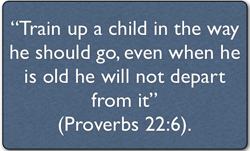 |
|
B) Obedience brings profit (Ephesians 6:2-3)
“That it may be well with you”
Honor your father and mother (which is the first commandment with a promise), 3 that it may be well with you, and that you may live long on the earth (Ephesians 6:2-3; Exodus 20:12; Deuteronomy 5:16).
The Ten Commandments
Have you noticed that verse two is part of the Ten Commandments (Exodus 20, Deuteronomy 5)? Perhaps one thing we observe from these verses is that Paul is speaking from some familiar verses.
Some Bible versions capitalizes the Old Testament quotes such as the NASB, others do not, but verses 2-3 are from a part of the Bible that most people are familiar with– the Ten Commandments.
In an attempt to rebel from God’s constraints on their lives, modernists have been trying to eliminate the presence of the Ten Commandments from courtrooms and educational buildings. Whether the plagues are there or not, does not really matter for God still uses them to rule the nations. The importance of these laws is seen by how God actually wrote them twice on stones. Paul mentions that they are the first command with a promise. The other commands had no promise attached to them. They were simple prohibitions. But this one did. This is very significant. Again, it reminds us of how important this one command is.
The promise is, “that it may be well with you, and that you may live long on the earth” (Ephesians 6:2-3). Does it not mean that without this obedience that things will not be well with you? Certainly it does. If by compliance to what God says here, blessing comes, then certainly we are to draw the conclusion that there is no assurance of blessing without obedience. These laws go right across the cultures. Cultures that adhere to the primacy of obedience to children will be blessed. This is the reason the Chinese civilization has lasted so long. The foundation of respect to parents, filial piety, has been a moral life virtue. Even if they do not believe God, if they abide by it, then they obey God and will share in the blessing.
What does this say of God? Does it mean that God is just trying to limit our fun on earth? Does it mean that God doesn’t really care for us? The opposite is true. Commands are designed to help keep the children in a safe playing environment. They become borders in which we can safely operate because God knows what lies outside of those parameters, problems will develop. You say, “What problems?” Let me mention a few.
Spoiled children
How many people like bratty or spoiled children? These children have not learned to value others. They think about themselves rather than how they should please others. They are not obedient. The parents don’t dare refuse them less a violent storm develop over the spirit of the child. The parents eventually persuade themselves that it is better to give no commands so their children so that they do not get upset. This is totally different than the perspective we find here, “Children are to obey parents.” Instead we have such rebellious children that parents are afraid to give commands to because they do not enforce them.
Clever and prideful children
When children are not called to obedience, then they become quite manipulative. Some children are worse than others, but the root problem is the same. They value the way they can get around their parents’ commands. They despise their parents’ wisdom seen in their rules. Some do it by shouting and temper tantrums, others by saying, “Okay, Mommy,” but in fact when they turn the corner, they disobey. They watch the television show they want, IM with their friends or talk to people their parents say they shouldn’t. They are wise in their own eyes. They are not wise but full of folly. They believe their ways are superior to their parents’ wisdom and pride themselves in their own ways. They even pay themselves all sorts of compliments on the way they got around their parents’ restrictions as their friends listen to your story.
Daring and bold
These same children often become daring and bold in a bad way. They should have learned the fear of God from their respect to their parents. It works this way. They learn that when they do something wrong, that there is a negative consequence. This is where discipline comes in. They learn from this that some things in life are wrong and at the same time learn to control themselves not to do such things. The purpose behind discipline (physical and otherwise) is to ensure that their children will obey their parents. When they do not have these set of negative consequences shaping their decisions, they do what they want in defiance to their parents if needed.
Children do not learn this immediately. They learn it over through repetition and in different settings. They learn something or mature and they want to see if the same negative consequences come to play. Parents, do not give up. We might get tired of pursuing them but otherwise they will like many other children make themselves the supreme authority. The terrible stories of young people killing themselves, getting doped up, hurting others all derive by children who have not submitted themselves to their parents’ rules.
They who fear no consequence. They are the fool.
They learn that doing certain things are wrong by sad experience such as those suffering from STDs or divorce. Some parents believe this fear of authority, like parents is unhealthy, but God our Maker says it is critical to a good life. If you do not believe me, just do a study on fifty people and see how their behavior is shaped by their parents. The more the children obey their parents, the happier and safer these young people will be.
Remember, this command is with a promise.
A child learns through obedience that some things are unsafe. They do not need to experiment with them. They have learned through their parents that smoking is unhealthy so they do not even seriously consider smoking because their parents say so.
“And you shall know the truth, and
the truth shall make you free” (John 8:32).
Obedience’s blessings are seen in the free spirit of the children living in obedience. They love their parents and have a proper perspective of themselves. The power of obedience is in its blessings. Conform to God’s truth and your whole life will be transformed. Jesus said it this way, “And you shall know the truth, and the truth shall make you free” ( John 8:32).
The problem is that we often never get to that point. I have met with many supposedly obedient children, but they only on the outward have obeyed their parents and sneakily deviated from what one’s parents really wanted. True obedience comes from the heart and there one will find great moving of the Holy Spirit. Paul the apostle gives us one more power-packed line with regards to obedience in Ephesians 6:4.
 Most of BFF articles such as this one is nicely formatted for printing. This article also has a Powerpoint. Check out the great number of articles on the BFF Biblical Training Library all at one low cost. |
Influence of the Family in the Ten Commandments
Reflection on a child's obedience from Proverbs 4
The father's duty to bring good into the family-Deuteronomy 6
Raising Godly Children
Need for Boundaries for Children
Read more exciting and practical articles on parenting. Just click on a link or graphic below.
| Parenting Seminar | Parenting Perspectives | Parenting Challenges | |
|
Biblical Parenting Principles provides helpful teaching on forming a godly family. This series provides good reading material with handouts and diagrams. (Chinese #1 The Goals of Parenting (Spanish) Understand the key role God's goals for the family have in shaping godly children. #2 One Great Team: Dad & Mom The responsibility, need and ability for husbands to work along with their wives as teammates in order to produce godly children. #3 Parental Authority Understand the parents' responsibility to govern their children and to properly put it in effect in the home. #4 Developing Self-Control in our Children The need and means of cultivating self-control in our children from an early age in order that they may please God and focus on serving others. #5 Child Training & Routines Enable parents to understand, use and create effective routines to further the training of toddlers and older children. #6 Correcting Your Children Properly deal with disobedient children so that they might become joyful family members. #7 Discipline & Use of Rod A scriptural perspective of discipline and ways to properly administer the rod. #8 Setting Boundaries Set up, implement and maintain proper and effective boundaries for our children. #9 Raising Godly Children Applying biblical principles to provide proper spiritual care for our children. #10 Developing Intergenerational Love Enable parents to show God's love and truth to their own parents and in-laws during visits with each other. #11 Restoring Older Children Even though we have made mistakes, we must not give up on our teens and older children. Lots of advice stemming from biblical principles are given to enable you to restore your children to your loving authority. Harmony in Parenting – Discipline Fathers Learn Effective Leadership |
Godly Beginnings for the Family series helps parents start right: filled with lots of practical advice for prebirth, birth and postbirth accompanied with reading, handouts and clear illustrations on early training. Check above for downloads. #1 Family Commitment Discipling Children in Anger Setting Television Standards Priorities for Family and Life Connecting Love with Discipline - Discover why love requires discipline -Hebrews 12. Discipling your sons: The why and way |
Children in Public Worship (New) Regaining the Hearts of Your Teens (New) Is Birth Control Christian? Recovering Biblical Parenting Can my son wearing earrings? Decay in society The Moral Slide of Sin Personal Impact Parents' Impact on their Children Devastating Effects of Secular Parenting Passing On a Love for God Need of Parental Love |
Read more exciting and practical articles on the Book of Ephesians.
Introduction to the Book of EphesiansBook of Ephesians Survey: Setting & Background Ephesians 1Ephesians 1:1-3 Every Spiritual BlessingEphesians 1:1 Only by the Will of God Ephesians 2Ephesians 2:1-3 Our Need, His GraceEphesians 2:1-3, an Introduction Ephesians 3Ephesians 3:1-10 Growing in Our Commitment Ephesians 3:20-21 God's Unlimited Power |
Ephesians 4Ephesians 4:1-3 Preserving the Spirit's UnityIntro: Problems of Disunity Ephesians 4:11-16 The Purpose of TrainingEphesians 4:11-13: A) God's Word in the Church Ephesians 4:14 B) Responsibility 1. Deceit Ephesians 4:11-14 Chart: Equipping of the Saints Ephesians 5-6Ephesians 5:8-14 Bible Study Questions |
BFF Homepage | Top | Back | BFF Topics | Ephesians 6:1-4 Study questions
Biblical Foundations for Freedom
Paul J. Bucknell
NASB Bible used


